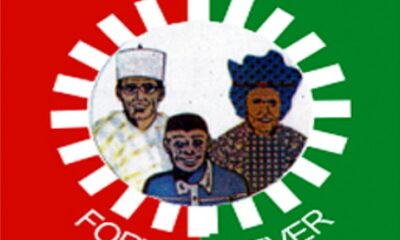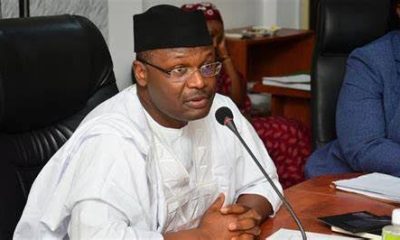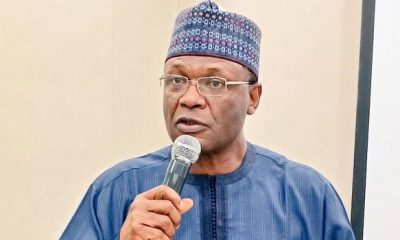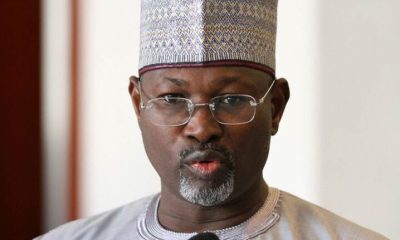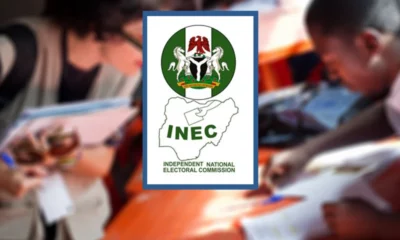News
INEC receives electoral management innovative tools from EU

The Independent National Electoral Commission (INEC) on Thursday received electoral management innovative tools from the European Union Support to Democratic Governance in Nigeria (EU-SDGN).
The tools came through the Development Alternatives Incorporated (DAI), to further enhance Nigeria’s electoral system.
The technology tools, received by the INEC Chairman, Prof. Mahmood Yakubu at the INEC headquarters in Abuja, were presented by acting Head of Development Cooperation of the European Union Delegation, Mr Ruben Aguilera.
They include Collation and Returning Officers Management System (CROMS); Election Results Management System (ERMS); Political Parties Financial Reporting and Audit System (PFRAS).
Also were Media Monitoring and Analysis tool as well as online App for voters and electoral officers, to easily locate existing polling units across the country.
Yakubu, while commending the EU-SDGN for the support, said INEC would closely examine the tools with a view to adopting or tweaking them where necessary, to meet the immediate and emergent challenges in the conduct of elections.
He commended EU-SDGN for its support for INEC under its Phase II Project with several components, the first of which focused on support to INEC through the DAI.
Yakubu said that the support was designed to address five thematic areas i.e. enhancing and strengthening planning and operational capacities.
Other areas are improving the Commission’s internal communication and external engagements with stakeholders and enhancing the Electoral Institute’s capacity for training and research, among others.
He said that within the current electoral cycle, DAI had provided support towards capacity building, technical support, printing of non-sensitive reports and information flyers.
He said INEC was glad that today, some of the tools developed in collaboration with DAI were being handed over to the commission.
These included the CROMS intended to streamline, simplify and enhance the security, reliability and credibility of the recruitment process for collation and returning officers, according to Yakubu.
“The ERMS seeks to ensure better results management process, enhancing accuracy and creating a repository of election results, something envisaged by Section 62 (1) and (2) of the Electoral Act, 2022.
“The Media Monitoring and Analysis tool intends to enhance the Commission’s capacity to filter media coverage of the Commission.
“The PFRAS seeks to assist the commission to monitor political party finance more efficiently and effectively,” he said.
Yakubu said that in developing the tools, DAI consultants worked closely with the technical team and directing members of staff of INEC.
He added that the tools sought to respond to specific challenges encountered in the implementation of electoral activities, thereby bringing technology to enhance the commission’s operational effectiveness.
“The tools therefore offer innovative solutions that could foster efficiency, speed, due diligence, and trust in the electoral process, “ Yakubu said.
The INEC chairman added that the tools were not specifically designed for a particular electoral cycle, hence their utility to future elections and electoral activities.
He said that the support to INEC under EU-SDGN Phase II covered the period 2022-2027, traversing two electoral cycles (2023 and 2027).
He said that the support also included support to the National Assembly and the judiciary, political parties, the media, civil society organisations and the promotion of inclusivity (women, youth and persons with disability).
Yakubu, who reiterated the commission’s readiness for future collaboration with the EU, re-emphasised that core electoral activities in Nigeria were fully founded by the Nigerian government.
“I would like to thank DAI and the EU-SDGN Project Phase II. The commission is open to future collaboration with the EU through its implementing partners.
“I must also continue to emphasise that core electoral activities are still funded by the Federal Government of Nigeria as a sovereign responsibility,” Yakubu said.
On his part, Aguilera said that the EU was hopeful that the tools handed over to INEC would contribute to improving the commission’s operations and Nigeria’s electoral system.
“Today’s handing over of these management tools is another example of how this collaboration can translate into concrete actions and supports for the benefit of INEC and Nigeria as a whole.
“We are looking at providing you new election results management systems tools that facilitate and provide an efficient management of results,” Aguilera said.
He said that handing over of the developed tools also demonstrated EU’s commitment to improving democratic system in Nigeria and across the globe.
“As you know EU support for election is consistent and part of our core principles.
“It is also in our own interest because we believe that without democracy there is no way a country can address its citizens’ needs and can really fulfill its capacity for development and to provide for opportunity for all.
“Therefore, we think that strong democratic institutions are the core.
“We are really investing and doing our best to help in Nigeria to provide support for those institutions to get stronger everyday.
“Stronger Nigeria also means stronger EU and we really hope and sincerely believe that this a common endeavour,” he said.
Commending the collaboration between the EU and INEC since return of democratic governance to Nigeria since 1999, Aguilera reiterated EU’s commitment to continue working and collaborating with all.
He added that the EU looked forward to the conclusion of ongoing INEC review of the 2023 general elections and lessons learnt would serve as road map for future collaborations and engagements.
“We are really looking forward to see how this will be implemented and could be part of review of upcoming of circle elections taking place in Bayelsa, Kogi and Imo States.
Headline
Prince Harry visits sick Nigerian soldiers in Kaduna

Prince Harry and his team visited the 44 Nigerian Army Reference Hospital in Kaduna to interact with wounded soldiers who are receiving treatment.
The Duke of Sussex is in Nigeria with his wife to champion the Invictus Games, which Harry founded to aid the rehabilitation of wounded and sick servicemembers and veterans.
Nigeria joined the Invictus Community of Nations in 2022 becoming the first African country to join.
Prince Harry’s visit to Kaduna came 68 years after his late grandmother Queen Elizabeth II visited the state during the time of the late Premier of Northern Region Sir Ahmadu Bello.




News
Senate approves death penalty for drug traffickers
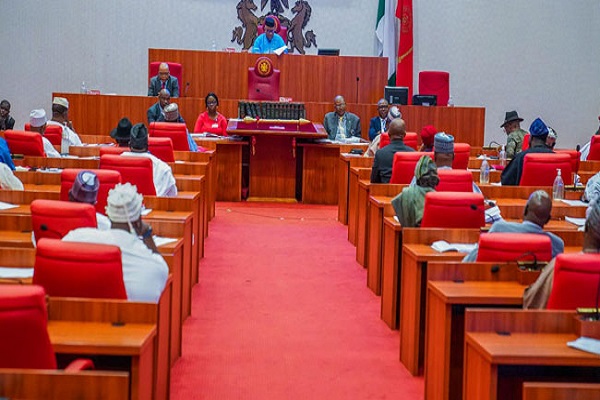
Senate on Thursday, May 9, approved the death penalty for those convicted on the charge of drug trafficking in the country.
The punishment prescribed in the extant NDLEA Act is a maximum sentence of life imprisonment.
The resolution of the Senate followed its consideration of a report of the Committees on Judiciary, Human Rights and Legal Matters and Drugs and Narcotics, National Drug Law Enforcement Agency (NDLEA) Act (Amendment) Bill, 2024.
The Chairman of the Committee on Judiciary, Human Rights & Legal Matters presented the report during plenary, Senator Mohammed Monguno (APC-Borno North).
The bill, which passed its third reading, aims to update the list of dangerous drugs, strengthen the operations of the NDLEA, review penalties, and empower the establishment of laboratories.
Section 11 of the current act prescribes that “any person who, without lawful authority; imports, manufactures, produces, processes, plants or grows the drugs popularly known as cocaine, LSD, heroin or any other similar drugs shall be guilty of an offence and liable on conviction to be sentenced to imprisonment for life” was amended to reflect a stiffer penalty of death.
Although the report did not recommend a death penalty for the offence, during consideration, Senator Ali Ndume moved that the life sentence should be upgraded to the death penalty.
During a clause-by-clause consideration of the Bill, Deputy Senate President Barau Jibrin, who presided over the session, put the amendment on the death penalty to a voice vote and ruled that the “ayes” had it.
But Senator Adams Oshiomhole objected to the ruling, saying that the “nays” had it.
He argued that matters of life and death should not be treated hurriedly, but Barau said it was too late, as he failed to call for division immediately after his ruling.
The bill was subsequently read for the third time and passed by the Senate.
-

 Headline5 days ago
Headline5 days agoPrince Harry visits sick Nigerian soldiers in Kaduna
-

 Entertainment5 days ago
Entertainment5 days agoAMVCA Cultural Day: BBNaija’s Neo, Venita win Best Dressed Male, Female
-

 Metro5 days ago
Metro5 days agoEx-Sports Minister laments after hospital neglected him for hours over N80000 deposit
-

 Headline5 days ago
Headline5 days agoEFCC bars dollar transactions, orders embassies to charge in naira

